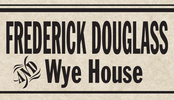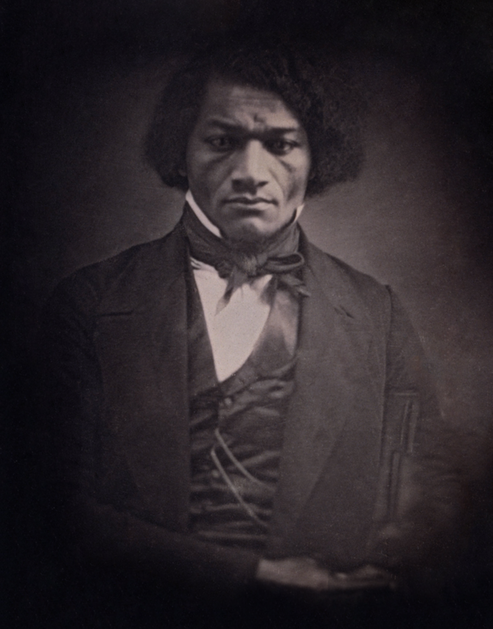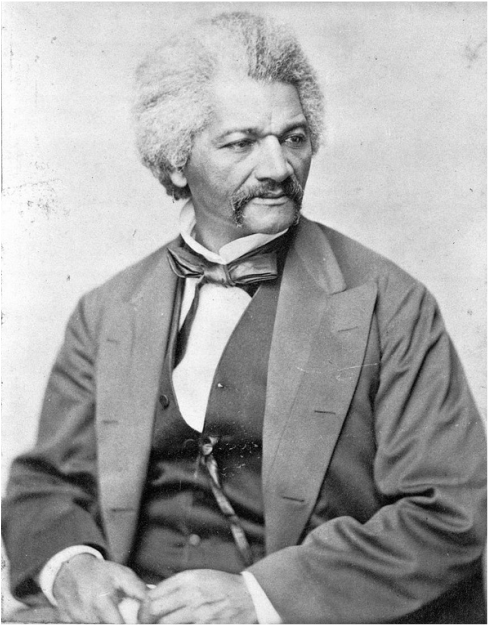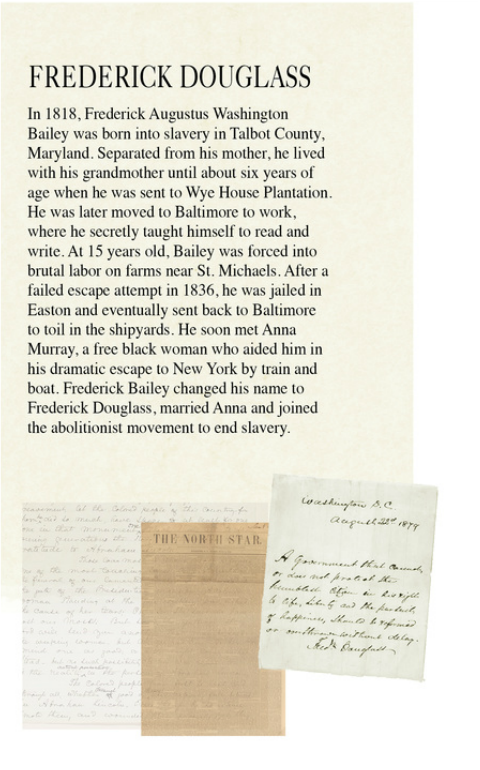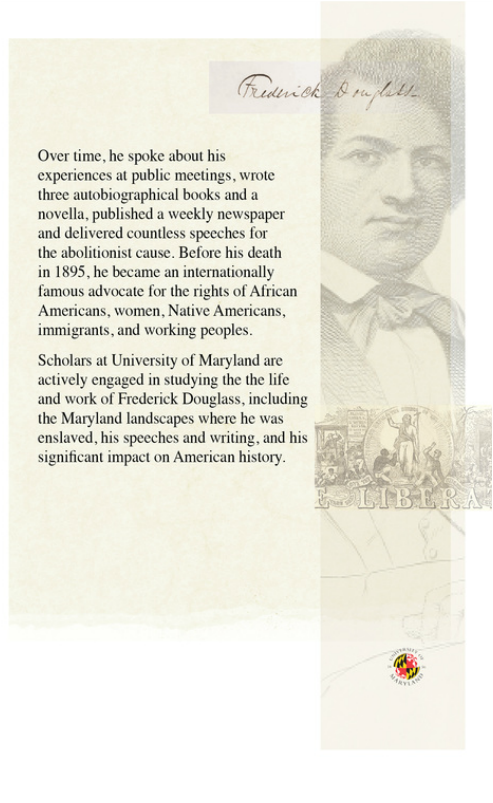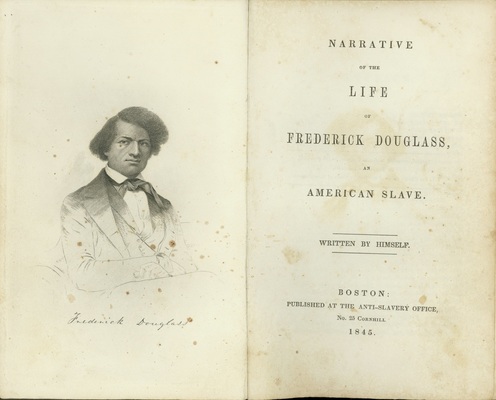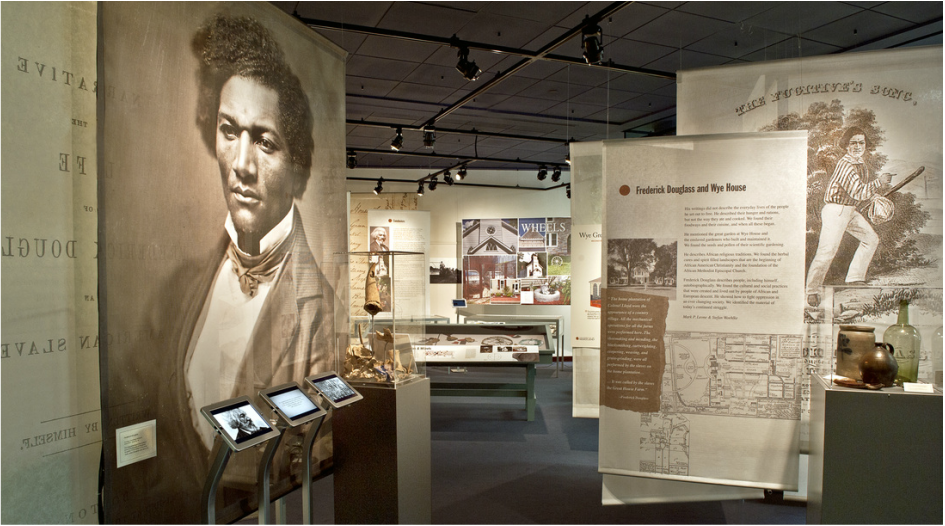RELIGION: AFRICA REMAINS
Frederick Douglass describes an African spirit practice while
recounting his confrontation with Edward Covey in 1834.
|
THE SLAVE BREAKER
“Mr. Covey had acquired a very high reputation for breaking young slaves, and this reputation was of immense value to him.” p. 50 “I had been at my new home but one week before Mr. Covey gave me a very severe whipping, cutting my back, causing the blood to run, and raising ridges on my flesh as large as my little finger.” p. 51 “I lived with Mr. Covey one year. During the first six months, of that year, scarce a week passed without his whipping me. I was seldom free from a sore back. My awkwardness was almost always his excuse for whipping me.” p. 52 SANDY AND THE ROOT “He told me, with great solemnity, I must go back to Covey; but that before I went, I must go with him into another part of the woods, where there was a certain root, which, if I would take some of it with me, carrying it always on my right side, would render it impossible for Mr. Covey, or any other white man, to whip me. He said he had carried it for years; and since he had done so, he had never received a blow, and never expected to while he carried it. I at first rejected the idea, that the simple carrying of a root in my pocket would have any such effect as he had said, and was not disposed to take it; but Sandy impressed the necessity with much earnestness, telling me it could do no harm, if it did no good. To please him, I at length took the root, and, according to his direction, carried it upon my right side. This was Sunday morning. I immediately started for home; and upon entering the yard gate, out came Mr. Covey on his way to meeting. He spoke to me very kindly, bade me drive the pigs from a lot near by, and passed on towards the church. Now, this singular conduct of Mr. Covey really made me begin to think that there was something in the root which Sandy had given me; and had it been on any other day than Sunday, I could have attributed the conduct to no other cause than the influence of that root; and as it was, I was half inclined to think the root to be something more than I at first had taken it to be. All went well till Monday morning. THE FIGHT On this morning, the virtue of the root was fully tested. Long before daylight, I was called to go and rub, curry, and feed, the horses. I obeyed, and was glad to obey. But whilst thus engaged, whilst in the act of throwing down some blades from the loft, Mr. Covey entered the stable with a long rope; and just as I was half out of the loft, he caught hold of my legs, and was about tying me. As soon as I found what he was up to, I gave a sudden spring, and as I did so, he holding to my legs, I was brought sprawling on the stable floor. Mr. Covey seemed now to think he had me, and could do what he pleased; but at this moment—from whence came the spirit I don’t know—I resolved to fight; and, suiting my action to the resolution, I seized Covey hard by the throat. My resistance was so entirely unexpected that Covey seemed taken all aback. He trembled like a leaf. This gave me assurance, and I held him uneasy, causing the blood to run where I touched him with the ends of my fingers. Mr. Covey soon called out to Hughes for help. Hughes came, and, while Covey held me, attempted to tie my right hand. While he was in the act of doing so, I watched my chance, and gave him a heavy kick close under the ribs. This kick fairly sickened Hughes, so that he left me in the hands of Mr. Covey. This kick had the effect of not only weakening Hughes, but Covey also. When he saw Hughes bending over with pain, his courage quailed. He asked me if I meant to persist in my resistance. I told him I did, come what might; that he had used me like a brute for six months, and that I was determined to be used so no longer. With that, he strove to drag me to a stick that was lying just out of the stable door. He meant to knock me down. But just as he was leaning over to get the stick, I seized him with both hands by his collar, and brought him by a sudden snatch to the ground. |
Narrative of the life of Frederick Douglass: An American slave
Douglass, F., & Garrison, W. L. (1846). Wortley, near Leeds: Printed by J. Barker. By this time, Bill came. Covey called upon him for assistance. Bill wanted to know what he could do. Covey said, “Take hold of him, take hold of him!” Bill said his master hired him out to work, and not to help to whip me; so he left Covey and myself to fight our own battle out. We were at it for nearly two hours. Covey at length let me go, puffing and blowing at a great rate, saying that if I had not resisted, he would not have whipped me half so much. The truth was, that he had not whipped me at all. I considered him as getting entirely the worst end of the bargain; for he had drawn no blood from me, but I had from him.t; and as I did so, I rose. He held on to me, and I to him.
A GLORIOUS RESURRECTION The whole six months afterwards, that I spent with Mr. Covey, he never laid the weight of his finger upon me in anger. He would occasionally say, he didn’t want to get hold of me again. “No,” thought I, “you need not; for you will come off worse than you did before.” This battle with Mr. Covey was the turning-point in my career as a slave. It rekindled the few expiring embers of freedom, and revived within me a sense of my own manhood. It recalled the departed self-confidence, and inspired me again with a determination to be free. The gratification afforded by the triumph was a full compensation for whatever else might follow, even death itself. He only can understand the deep satisfaction which I experienced, who has himself repelled by force the bloody arm of slavery. I felt as I never felt before. It was a glorious resurrection, from the tomb of slavery, to the heaven of freedom. My long-crushed spirit rose, cowardice departed, bold defiance took its place; and I now resolved that, however long I might remain a slave in form, the day had passed forever when I could be a slave in fact. I did not hesitate to let it be known of me, that the white man who expected to succeed in whipping, must also succeed in killing me. From this time I was never again what might be called fairly whipped, though I remained a slave four years afterwards. I had several fights, but was never whipped. It was for a long time a matter of surprise to me why Mr. Covey did not immediately have me taken by the constable to the whipping-post, and there regularly whipped for the crime of raising my hand against a white man in defence of myself. And the only explanation I can now think of does not entirely satisfy me; but such as it is, I will give it. Mr. Covey enjoyed the most unbounded reputation for being a first-rate overseer and negrobreaker. It was of considerable importance to him. That reputation was at stake; and had he sent me—a boy about sixteen years old—to the public whipping-post, his reputation would have been lost; so, to save his reputation, he suffered me to go unpunished.” p. 61-64 |

FREDERICK DOUGLASS
by unidentified photographer - circa 1850 daguerreotype
Onondaga Historical Association, Syracuse, NY
by unidentified photographer - circa 1850 daguerreotype
Onondaga Historical Association, Syracuse, NY
